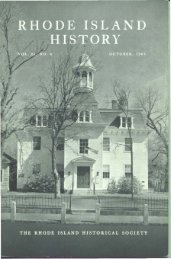RHODE ISLAND HISTORY - Rhode Island Historical Society
RHODE ISLAND HISTORY - Rhode Island Historical Society
RHODE ISLAND HISTORY - Rhode Island Historical Society
Create successful ePaper yourself
Turn your PDF publications into a flip-book with our unique Google optimized e-Paper software.
18 ANNUAL REPORT<br />
Annual R~port of th~ Director<br />
~ Public Hi5tory" is a term of recem origin usoed to describe<br />
the work of historians in museums. historical socieues.<br />
archivts. research libraries, prewrvation agencies and<br />
publications peojecta. Wh ilt the ttml i' new , the tmploymem<br />
of the historians' skills in thew area.s is not. The<br />
<strong>Rhode</strong> <strong>Island</strong> HIStorical <strong>Society</strong> has been providing historical<br />
socitty services to the public for over a cen t ury and a<br />
half. One poMoibie nuance imph«i by the C\I"tnt use of tht<br />
term i$ that thiS work is done for the direct benefit of the<br />
public. Expanded public programming in the humamues<br />
has become Oil major recem develepmem among cultural<br />
organizations. The nineteemh-century lecture institutions<br />
of the Lyceum and the Cbataequa movement have become<br />
today's "adult edcceoco.' "Con tinuing Education," or<br />
" Lifetime Learning' project. There is not yet agreement<br />
among the historians working in public places that they<br />
should spend It'SoS time in their traditional scholarly<br />
research roles and more time learning the tec h nology and<br />
psychology of being story-tellers. Being the "bionic his torian"<br />
or a television personality is both a challenging and<br />
unsettling prospect. None theless. there are compelling<br />
arguments in favor of using every modem technique 10<br />
transmit the meaning and significance of our his torical<br />
collecncns to even larger audiencK. There art those who<br />
complain that tOO many museums have put all, or all tOO<br />
much. alttntion to piling up eolleences without a thought<br />
or a care as to how or ....hen the coIltctKlns are to be used,<br />
Othen SlJggtst that as much thought. entrgy and resou.rcn<br />
ought to be employ«i in information distribution<br />
as are expended in tht enthusiastic chase afttT acquisitions.<br />
I beheve there is much to be said for taking are that the<br />
excellence. important insights. and best inttntions that<br />
originate at the highest levels of any institution art nat<br />
dilut«i or diminished ....hen they reach the final point of<br />
delivery to the person for whose ultimate use they Wtrt<br />
intended. This is the kind of equilibrium the <strong>Rhode</strong> <strong>Island</strong><br />
Histori ca l <strong>Society</strong> has sought to achieve; we think ou r<br />
report for the year 1979 provides concrete examples of that<br />
achievement.<br />
The opening of the Museum of <strong>Rhode</strong> <strong>Island</strong> History at<br />
Aldrich House was not only a highpoint of the past twel ve<br />
months. but th e Fulfillment of nearly five years of planning<br />
and hard work. T he inaugural exhibition, "The Lay of the<br />
Land:' accomplished ou r goal of providing visitors with a<br />
visually dramatic and imelltctually comprehensive displa y.<br />
The reepcn se to il has been very encouraging: not on ly<br />
A











